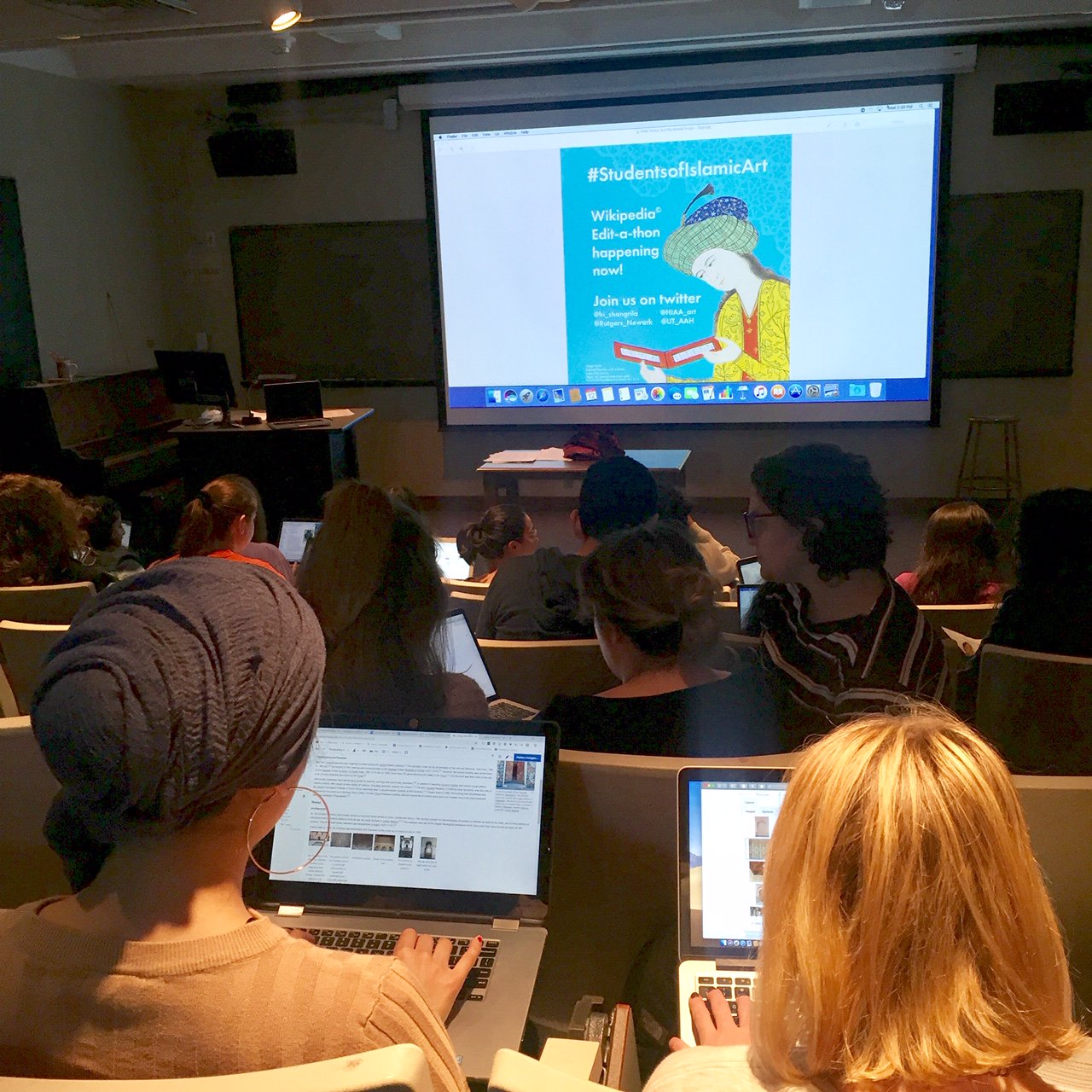“I was hesitant about shaking up a popular class that had worked well for years, but one statistic finally convinced me. … And this assignment quickly took on a much deeper significance than a research paper.”
Dr. Stephennie Mulder at University of Texas at Austin decided to scrap the research paper for her Fall 2018 term and have students collaborate and rewrite Wikipedia pages. “It ended up better than I could have imagined and transformed how I think about teaching,” she shared over Twitter when the course wrapped up.
She has now taught a Wikipedia writing assignment in two of her Islamic art history courses, once in Fall 2018 and again in Fall 2019. One student from last fall uploaded a photo of metalworking detail to the Wikipedia article about the history of metallurgy in Mosul. Another created a new article for an object of islamic art by translating the one on the French Wikipedia. In this most recent course, 26 students added 154 references to 9 total articles. Overall a great success for representing topics related to Islamic art history on Wikipedia.
Dr. Mulder shared her reasons for incorporating the Wikipedia writing assignment again via Twitter:
“I was hesitant about shaking up a popular class that had worked well for years,” Dr. Mulder reflected after that first term. “But one statistic finally convinced me: 90% of Wikipedia articles are written by men – and largely by men from Euro-American contexts,” she wrote, citing an article in the Guardian.
“The oft-maligned Wikipedia is now the world’s most frequently-consulted source of information and fifth-most visited website. Because anyone can be an editor, it’s on us to make it the best resource it can be. If you think Wikipedia is bad, look in the mirror. Wikipedia is us.”
“So this assignment quickly took on a much deeper significance than a research paper. It required [students] to develop many of the same research and writing skills as a research paper, but it also came to have a strong civics and social justice component, and the students responded.”
“To emphasize the collaborative, real-world applicability of the assignment, I set it up as a partnership with a museum and another Islamic art class via my brilliant colleagues Dr. Leslee Michelsen and Dr. Alex Dika Seggerman.”
“The assignment asks [students] to imagine they’re hired as consultants for a major museum to improve the public’s knowledge on Islamic art, in advance of an exhibition. Their task? To assess an article for the quality of its sources and content and then research, write, and improve it.”
“The assignment was set up on Wiki Education’s terrific website. Students had to complete a training module/week. Through this and discussion in class they learned how to determine quality of sources, the value of peer review, and improved research methods.”
Dr. Mulder also called upon materials from Art & Feminism, as well as the help of librarians at UT Austin.
“I also spent a day in the library with students, walking them through basic research methods. I thought this might be too basic but the day walking them through the physical library was inspired by a comment made by one of our brightest Honors Art History undergraduates in a meeting of the UT Provost’s Libraries Task force (on which I currently serve): ‘Many faculty and librarians don’t realize that it’s not that undergraduates don’t want to use the libraries, it’s that we are SCARED of the libraries. She explained that many students no longer receive the basic training needed to know how to use the libraries. So they don’t.”
“Just getting them physically in the library was revelatory. They were astonished at the range and quality of sources that did not turn up on a Google search. It really lit a fire under them, sparked their curiosity and made them want to dive in. This was revelatory for me too!”
“We talked about what a privilege it is to have access to depth and reliable quality of knowledge in a top research library. We talked about how access to knowledge controls the way we see the world and our place in it. Again and again, students spoke about feeling empowered.”

“Yesterday we met for an upload party. I wasn’t sure how it would go, but it turned out to be one of my favorite days as a teacher EVER. I am so proud of my students and of their hard work. I am amazed at how seriously they took the assignment and what a terrific job they did.”

Photo by Dr. Mulder, rights reserved.
“There were challenges: the sometimes-difficult collaborative aspect of a group assignment, the fact that some topics had few sources, the challenge of learning to write in a neutral, unbiased style. But they had something real on the line: an article out there in the world. And in the end, these smart students have now contributed 15 better-sourced, better-written articles to the most frequently-consulted body of knowledge in the world. And they’ve learned key research and writing skills that will be applicable in a range of fields.”
That number has now risen to 29!
“In short, this assignment did all a traditional research paper does: deepening knowledge, research, and writing skills – but it also left them feeling empowered to be active contributors: shaping global knowledge and redressing imbalances that shape the way we see the world.”
“So if you’ve ever wanted to have students do a Wikipedia article writing project, I would encourage you to jump in and follow Wikipedia’s motto: Be Bold. Your students will learn, and you will all feel like you made the world just a tiny bit better place to be.”
To incorporate a Wikipedia writing assignment into an upcoming course, visit teach.wikiedu.org for access to free resources and assignment templates.
